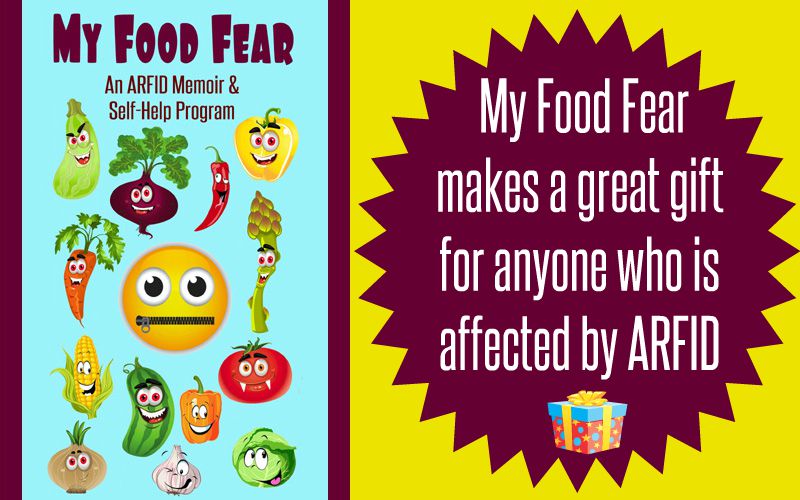Avoidant restrictive food intake disorder and OCD often exist together and can actually often be misdiagnosed for one another when only when is present. What is the connection between ARFID and obsessive compulsive disorder?
Obsessive compulsive disorder is largely misunderstood by most people. They typically oversimplify it to fit in a neat little box (definition) and characterize all affected people very similarly. However, compulsions can take countless forms and many people with OCD are NOTHING like you might imagine them to be!
I suffered from extreme ARFID for most of my life years and finally was able to cure the condition, allowing me to not only eat normally, but also truly ENJOY food! However, I also suffered and continue (to a lesser extent) to suffer from mild OCD for my entire life. Since I have spent a lifetime working to help people with various types of chronic pain and psychoemotional disorders like OCD, I find myself fascinated by the connection between eating disorders and compulsive behavior.
Avoidant Restrictive Food Intake Disorder and OCD Relationship
Both selective eating disorder and obsessive compulsive disorder can exist independently of one another. They are 2 completely separate and distinct diagnoses. However, they might be related and are sometimes misdiagnosed for one another, especially in cases of an ARFID diagnosis where the person is actually obsessive compulsive and merely demonstrating their behavior compulsions towards food.
ARFID can be created by an underlying tendency towards compulsive behavior from an early age. People who are prone to OCD might apply their compulsions to their eating habits (as well as many other aspects of their life). Recognizing obsessive behavior patterns is very important if a person with ARFID seeks treatment, since the problem might go far deeper than simply finicky eating habits…
On the other hand, it is rare for people with primary ARFID to develop OCD in other aspects of life. ARFID, unto itself, is not inherently obsessive, although it often is. Just because a person demonstrates primary avoidant restrictive food intake disorder does not mean that other aspects of their life with be filled with behavioral imperatives and compulsions.
Avoidant Restrictive Food Intake Disorder and OCD Treatment Considerations
I have corresponded with many people who to me were obviously suffering from primary OCD, with a tendency to express their compulsions towards food and eating habits. These people certainly did qualify to be diagnosed with ARFID based on many criteria, were it not for the obvious fact that the underlying cause of their ARFID was widespread OCD tendencies. Some of these people were not doing well in treatment with various types of care providers and now it was obvious why…
When OCD is the primary underlying source of selective eating habits, simply treating the eating disorder alone is often not sufficient. The OCD tendencies towards behavioral imperatives go undiscovered and therefore untreated, making it virtually impossible for the person to overcome the food-related aspects of their compulsive behaviors. This is why I have come to recommend that ALL health professionals who work with people with ARFID should actively look out for evidence of a larger underlying OCD condition. This is important to recognize and treat if the person is to have the best chances of overcoming their problematic imperatives, behaviors and the many consequences that are incurred due to these compulsions.
Obviously if a person is not in ARFID treatment and has no desire to change their eating habits (many do not want to change and SHOULD NEVER be forced to change) then this is an unimportant consideration. After all, a diagnosis is only valuable when it leads to a cure and if no cure is desired, then a diagnosis is merely a worthless label…
Avoidant Restrictive Food Intake Disorder and OCD in My Life
I never really linked my mild OCD tendencies and my extreme ARFID until much later in life. I always felt different in many ways (not good ones) and knew I was, in fact, (objectively) different than most people in many ways from an early age. I recognized my own eating issues very young and probably became self-aware of my OCD tendencies around the age of 9 or so. As a teenager, I began to explore these issues inside myself and this desire to expose, explore and understand my inner workings is a process that continues to this day.
I was able to end my eating disorder in my late 30s, without the desire to even do so. I never set out to change and in fact, never wanted to change my peculiar eating habits. However, the circumstances of my life created a cure for me and it was a wonderful blessing. Food has become very important to me now and I feel I made positive changes in my eating habits just in time to help me to stay healthy as I get older…
I was never a serious case of OCD and do not feel that I would qualify for a clinical diagnosis. I did have times in my life when I was much more compulsive, but I was able to overcome these organically as I recognized the behaviors and dug out the underlying psychoemotional reasons why they existed. I still do demonstrate some small degree of OCD on occasion, but it is more of a passing and insignificant part of my life now more than ever before. I would not say that the OCD trait has been purged, but would say that it has been reduced in power to such as small level that it is barely present in day to day life.
I write all of this to help people who may be suffering from one or both conditions. ARFID and OCD can be mistaken for one another. They can exist in tandem with one another. The more you can work to identify them correctly in yourself (self-help) or with a professional, the better your chances of successfully ending one or both, as applicable. I write much about this topic of OCD and selective eating in my humorous book My Food Fear. If you find this post interesting, you will love the book!


Leave a Reply
You must be logged in to post a comment.